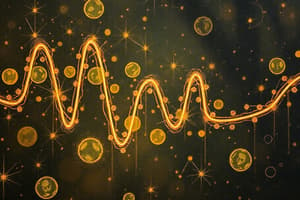Podcast
Questions and Answers
What are graded potentials?
What are graded potentials?
- Action potentials (correct)
- Depolarizations (correct)
- Hyperpolarizations (correct)
- All of the above
Action potentials always lead to depolarization of the membrane and reversal of the membrane potential.
Action potentials always lead to depolarization of the membrane and reversal of the membrane potential.
True (A)
Amplitude is all-or-none and does not vary with the strength of the stimulus.
Amplitude is all-or-none and does not vary with the strength of the stimulus.
True (A)
What is the typical amplitude of graded potentials?
What is the typical amplitude of graded potentials?
What is the typical duration of graded potentials?
What is the typical duration of graded potentials?
Which ion channels are responsible for graded potentials?
Which ion channels are responsible for graded potentials?
What ions are typically involved in graded potentials?
What ions are typically involved in graded potentials?
Graded potentials have a refractory period.
Graded potentials have a refractory period.
Action potentials can be summed over time and across space.
Action potentials can be summed over time and across space.
How do graded potentials propagate?
How do graded potentials propagate?
Amplitude of graded potentials diminishes as they travel away from the initial site.
Amplitude of graded potentials diminishes as they travel away from the initial site.
What triggers action potentials?
What triggers action potentials?
Where do graded potentials occur primarily in neurons?
Where do graded potentials occur primarily in neurons?
Flashcards are hidden until you start studying
Study Notes
Graded Potentials
- Graded potentials can be either depolarizing or hyperpolarizing, depending on the stimulus.
- The amplitude of graded potentials directly correlates with stimulus strength; stronger stimuli yield larger potentials.
- Amplitude typically ranges from a few millivolts (mV) to tens of mV.
- Graded potentials may last from milliseconds to several seconds.
- Ion channels for graded potentials include ligand-gated, mechanosensitive, temperature-sensitive, and those gated by cytoplasmic signaling molecules.
- Common ions involved in graded potentials are sodium (Na+), potassium (K+), and chloride (Cl−).
- Graded potentials can be summed temporally (over time) and spatially (across space).
- Graded potentials spread passively (electrotonic spread) and diminish in amplitude as they travel away from the site of origin (decremental).
- External stimuli or neurotransmitter release can induce graded potentials at synaptic contact points or sensory reception areas.
Action Potentials
- Action potentials always result in depolarization of the membrane and a reversal of membrane potential.
- Action potential amplitude is all-or-none, with strength indicated by the frequency of firing.
- Action potentials exhibit a large amplitude of approximately 100 mV.
- The duration of action potentials is relatively brief, typically 3-5 milliseconds.
- Voltage-gated sodium (Na+) and potassium (K+) channels are essential for generating action potentials.
- Action potentials primarily involve Na+ and K+ ions.
- They include absolute and relative refractory periods, which are critical for proper neuronal signaling.
- Unlike graded potentials, summation cannot occur; action potentials are either fully generated or not at all due to their all-or-none response.
- Propagation of action potentials is characterized by regeneration at every point along the neuronal membrane, maintaining amplitude throughout the journey (non-decremental).
- Action potentials initiate when the membrane depolarizes to a threshold level, making graded potentials important for this initial depolarization.
- Action potentials occur in areas where voltage-gated Na+ and K+ channels are densely populated.
Studying That Suits You
Use AI to generate personalized quizzes and flashcards to suit your learning preferences.



